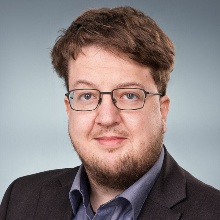Theory and simulations of chemical processes are becoming increasingly important for investigating chemical issues. The models obtained can be used to improve process control. They can also be applied to other, similar reactions, so that, for example, real experiments with hazardous or environmentally critical substances can be avoided.
Jan Meisner, former PhD student at the Stuttgart Center for Simulation Science's graduate school and a new assistant professor at Heinrich Heine University in Düsseldorf, and his nascent research group will use and further develop modern simulation methods in chemistry. They will focus on the automated calculation of complex chemical systems and the generation of reaction networks. Prof. Meisner states that "a complex chemical reaction consists of a long sequence of individual reactions, some of which occur so quickly that they can hardly be measured in the laboratory. Here, simulations help to understand the individual steps."
One tool is the so-called molecular dynamics simulation. It can be used to decipher the individual nodes (chemical species) and their connections (reactions) in a chemical reaction network, ultimately providing a better understanding of the time course of a reaction. If one knows a reaction network, one can feed its parameters into further simulations, so that the networks gradually become larger and larger. "We also want to use machine learning methods to decode reaction networks even more efficiently.", says Prof. Meisner.
In his previous work at Stanford, Meisner successfully applied these methods to smaller molecular systems. But it is so powerful that it can be used to study a wide range of chemical reactions.
One future field of application will be homogeneous catalysis, whose numerous side reactions and inhibition mechanisms are poorly known, if at all. Network analyses can also be used to investigate issues in bio-, environmental or atmospheric chemistry, such as the decomposition of biodegradable polymers or the effect and degradability of greenhouse gases.
Stuttgart is also very pleased about Meisner's success and thus his appointment at Heinrich Heine University in Düsseldorf. Johannes Kästner, under whom Jan Meisner earned his doctorate in SimTech, is certain that "Jan [will] use his profound knowledge of chemistry and his methodological skills to do innovative science around the simulation of complex systems. And if he takes care of his co-workers even half as well as he took care of mine during his PhD, I'm sure this will be an outstanding group."
About Jan Meisner
Jan Meisner (born 1988 in Waiblingen) studied chemistry at the University of Stuttgart (master's degree in 2013). He also received his doctorate there in 2017 with distinction in the field of theoretical chemistry with work on the quantum mechanical tunneling effect and water formation in the interstellar medium. During his doctoral studies, he already conducted research at times in Groningen in the Netherlands and in London. After his doctorate, he worked as a postdoc first in Stuttgart and then - supported by a DFG research fellowship - at Stanford University and Stanford Linear Accelerator Center in California in the USA. On April 1, 2021, he will take up the junior professorship for "Theory and Simulation of Complex Systems" at HHU's Scientific Institution Chemistry. Prof. Meisner has already won various research awards for his work. Among others, he received the Wilhelm Ostwald Award of the German Chemical Society in 2020 for outstanding interdisciplinary doctoral work. His list of publications shows 27 publications, eleven times as first author alone.
Orginal author and news: Dr. Arne Claussen (HHU)


